On Trump’s aggression against Venezuela and interference into Brazil’s judiciary.
On Trump’s aggression against Venezuela and interference into Brazil’s judiciary.
The US aggression against Latin American countries is widening its scope. After Venezuela, the US navy has also targeted Colombian citizens in a boat while, the Presidents Trump and Petro are engaging in strong polemics. Simultaneously unsolved is the spat between Brazil and the US, which escalated when a Brazilian court sentenced former President Bolsonaro guilty of an attempted coup d’etat, with Washington placing the judges under sanctions in reaction.
We interviewed on both issues Monica Valente. Valente is General Secretary of the São Paulo Forum, the congregation of Latin American leftist and progressive political parties, of which several are in government. She is at the same time Member of the National Executive Committee of Brazil’s Workers’ Party.
I’m going to ask you about both of your presentations. First, from the perspective of the São Paulo forum, a comprehensive organization of the Latin American left, the main topic being the US threat against Venezuela. What is your opinion, position?
Well, many years ago, we, as the São Paulo Forum, developed our strategy to achieve regional integration as a region, even to confront imperialism. Now, we’re experiencing a more extreme situation with the Trump administration, which is threatening Venezuela with its ships and marines in the maritime space. And once again, with lies, because all the UN reports on the drug issue confirm that Venezuela is not a major producer, and neither do the drugs that go to the United States pass through Venezuela. But as we saw with the aggression against Iraq, where the chemical weapons issue was a lie, once again the empire is using a lie to carry out an unprecedented aggression against Venezuela and the Venezuelan government. So, we are united in the defense of Venezuela, as well as in the defense of our peoples.
For example, in Brazil, there is a very serious threat against Brazilian democratic institutions. The government, but also the justice system, regarding the conviction of former President Bolsonaro for an attempted coup on January 8, 2023. This is also the threat against Colombia, President Petro’s government, the continued blockade of Cuba, and Cuba’s return to the list of state sponsors of terrorism.
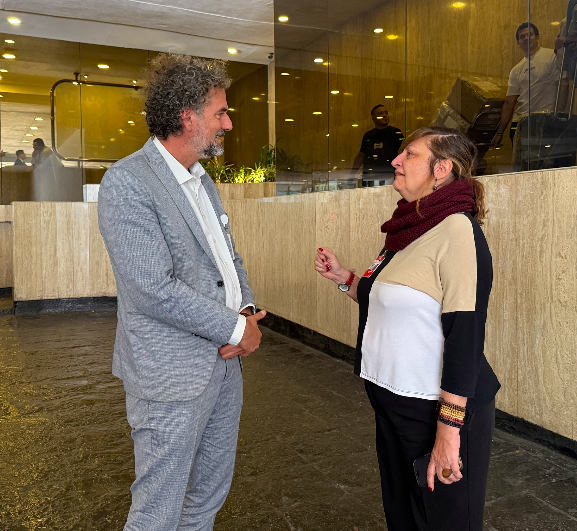
BRICS places Latin America in a “more prominent position”
And the statements by the current Secretary of State, Marco Rubio, and other leaders of the Trump administration, that they want to make Latin America and the Caribbean their backyard again.
We’re working on that. We’re going to defend ourselves. We’re going to seek integration between our peoples and our progressive governments to further confront this challenge. And now, in this new moment of global geopolitics, Brazil and other Latin American countries are also part of the BRICS group, which also places us in a more prominent position as the global South to confront these threats.
So, the forum, as a very diverse and broad articulation of progressive, revolutionary, left-wing parties, has as its unifying banners integration, the defense of sovereignty, the defense of Latin America and the Caribbean as a zone of peace, which is the 2014 CELAC proclamation. We are continuing our struggle in that direction.
The issue of Latin American integration
The forum is one of parties, so maybe the question is a little difficult, but there’s the concept of the great homeland, Latin American integration. How is cooperation between the parties progressing regarding economic integration?
Well, in 2023, we had a very important meeting of governments, of all South American governments, but it was called by President Lula, and attended by President Maduro, President Petro, President Moritz, but also presidents from the South American right wing, who have advanced many proposals for infrastructure integration, such as integration routes. It’s true that this is not a simple task, but as parties, we continue to support these initiatives that seek to integrate us in infrastructure, energy integration, healthcare, and defense.
That’s not a simple task, as I said, because we have governments that are against regional integration. They consider the regional integration we defend as a “Bolivarian integration”, in quotes. But integration is the way out for countries like ours, because isolated and separated, we don’t have much of a chance of integrating into the world that’s changing in the face of the crisis of global capitalism, in the face of wars, and the elusiveness of freedom and the arms race to solve, for example, the economic crises in the United States and even Europe.
So, as parties, we support these initiatives, and on the other hand, as parties, we also have very strong alliances with social and popular movements in our America in this same sense. For example, in November of this year it will be 20 years since we defeated the FTAA proposal, the Free Trade Area of the Americas proposed by the US government.
So, we will all be together—parties, social movements, labor movements, feminist movements, popular movements in Mar del Plata—commemorating the 20th anniversary of the defeat of the FTAA, but also seeking to advance unitary initiatives to advance integration and the defense of our sovereignty. As well as the social CELAC, which is an initiative in which the São Paulo Forum also participates as one of the protagonists, together with social and popular movements to advance integration and the defense of our region.
Two questions for Brazil. First, Trump’s intervention in the judicial process in Brazil. It seems crazy, but what do you say? Sanctioning judges?
Nowadays, many things that we thought were crazy tend to happen. We all know about the friendship and ideological identity between Trump and former President Bolsonaro. Both are far-right with a neo-fascist profile, and when the impeachment of former President Bolsonaro and the military officers who accompanied him in the previous government was about to happen, we received numerous threats, including the use of economic sanctions against Supreme Court judges and sanctions such as the revocation of visas for ministers in the Lula administration, like the Minister of Health, for having implemented an alliance with the Cuban government in the previous government of Dilma Rousseff to provide doctors in the vast Brazilian regions where we couldn’t find doctors. The Cuban doctors from the Rives brigades helped us enormously for that reason. Lula’s current Minister of Health, who was also a minister under Dilma, has had his visa revoked; he hasn’t been able to go to the US, the UN General Assembly for many activities of the PAHO, the Pan American Health Organization.
This is utter absurdity. And both the Supreme Court and President Lula and his entire government have given a very strong response. We will not negotiate, even with the threat, which was confirmed, of a 50% tariff increase on bilateral trade between Brazil and the United States. That was no reason for the Supreme Court and the government, the executive branch of President Lula, to have extended the hand of our sovereignty and of Brazilian democratic institutions, which are the best we managed to build after the military dictatorships of the 1960s and 1980s.
Dialogue between Trump and Lula
And now, in this assembly, it seems that Donald Trump, when President Lula very categorically stated that this was not up for discussion—our sovereignty, our institutions, that was a problem for Brazilians—seems to have backed down a bit. Let’s see. Yes, he backed down, he said, ‘look, it seems President Lula is a good person, I don’t know what, we’re going to talk, we’re going to hold bilateral meetings’. President Lula responded: ‘we are always willing to engage in trade dialogue, defending Brazil’s interests, but our sovereignty is not up for discussion for anything’.
In addition to that, there are also ongoing threats against the Supreme Court justices. Many were financially sanctioned under the Magnitsky Act, which is something the empire uses against its supposed enemies, but we will not take a step back on this issue. The United States has a long history of sanctions, and the Trump administration must respect our decisions.
How is Brazil’s effort to coordinate a joint south-south response to Trump’s tariffs?
Yes, that’s the initiative of President Lula, along with the BRICS leaders, President Xi Jinping, President Putin, President Modi of India, President Ramaphosa of South Africa, of South Africa. They held a very interesting and productive meeting, exchanging opinions and strategies, because each of these countries has its own interests.
So, the entire effort of the BRICS in this meeting was to find, let’s say, to find common ground to be able to have a relationship with the empire as equals. That’s what we’re working on. We know it’s not a simple matter at all. It’s difficult because each of our countries’ economies has its own business and industrial sectors, its own economy. It’s important that we understand that each of the governments has to protect its people and its economy. But that’s a process that won’t go backwards.
Because the BRICS, as a group that champions multilateralism and cooperation, has been consolidating itself for many years as a space for exchange, but also a space for multilateralism and cooperation. So, that’s why the BRICS attracts so many countries, many countries want to be part of the BRICS.
Venezuela and BRICS: “Rather sooner than later”
Will Venezuela be included?
Well, President Lula mentioned in this, shortly before the Rio de Janeiro summit in July, that he was asked, look, what about the issue of Venezuela in the BRICS? And President Lula answered, using Brazilian music from a very, very, very famous Brazilian singer, that the BRICS are a walking metamorphosis, I don’t know if you understand.
Changing, not changing.
Changing, and yes, that’s a sign that this issue will be resolved sooner rather than later. Because the BRICS are not traditionally a multilateral space. It is multilateral, it has a deeply multilateral character, but it doesn’t propose to create an organization like the UN and others. But that, therefore, is in progress, and we hope that this matter will be resolved sooner rather than later.







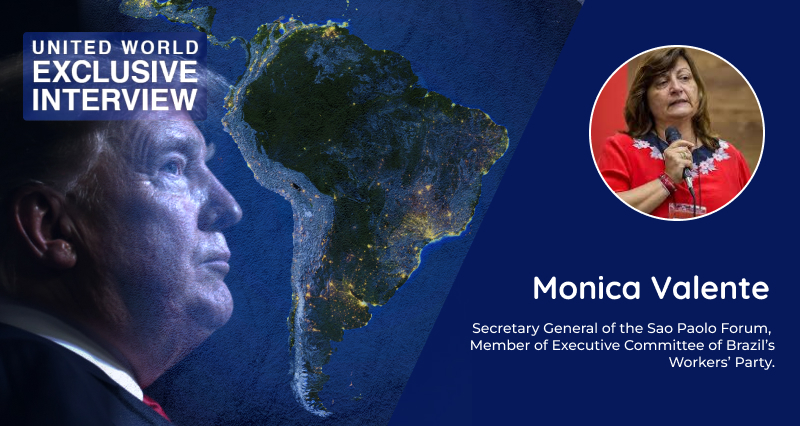
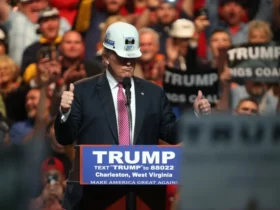
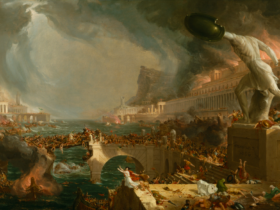
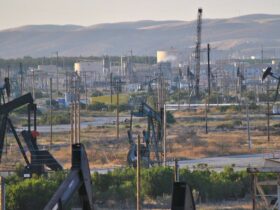
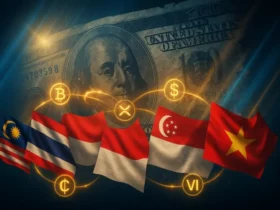
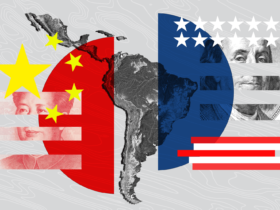


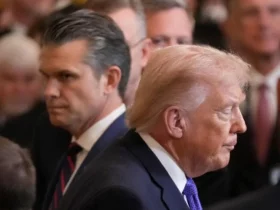

Leave a Reply